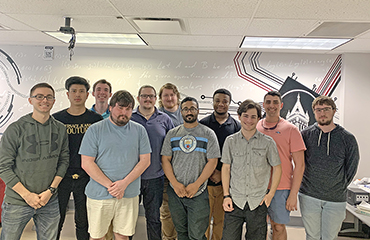
With the attention being paid these days to preparing for the Covid-19 virus, an achievement of Lander University's cyber defense team might pass unnoticed.
The team, made up of 11 students, recently competed against 33 other schools in the first round of the Southeast Collegiate Cyber Defense Competition (SECCDC) and finished in the top eight, along with such larger schools as Clemson, Florida State, and the University of Florida.
By finishing in the top eight, Lander qualified to participate in the championship round of the 15th annual SECCDC Regional Competition, held at Kennesaw State University in Georgia. The winner of that round qualifies for the National CCDC Competition in Orlando, Fla.
Competition organizers are attempting to reach a decision as to whether this year's event will go on as planned.
The competition consists of student teams' attempting to keep the online services of a fictional company going while warding off cyberattacks launched by the other schools and industry professionals.
"Our kids are supposed to set up a defense of our network, and the other schools are supposed to try to hack into it. At the same time, we're trying to hack into their server, into their set-up," said Lander Professor of Physics Dr. David Slimmer, dean of the College of Science and Mathematics.
"I liken it to Capture the Flag," he said.
Slimmer said he was impressed with the performance of Lander's team in the first round, despite going up against numerous larger schools, with more faculty members and bigger budgets. He believes that being a small school has its advantages.
"Our students know our faculty members well. They're comfortable asking them questions, and listening to their advice," he said.
It also helps that the team members know each other.
"It isn't like, 'Hey, my name's Steve, let's conquer this project together'; these are people that may be roommates, they're connected."
Slimmer said that the impressive showing is proof that Lander's "instruction is of a good caliber. I think it also says that we have good students. They thrive in that smaller environment, and these are the results. Our teams have been getting better and better at these competitions as time goes on," he said.